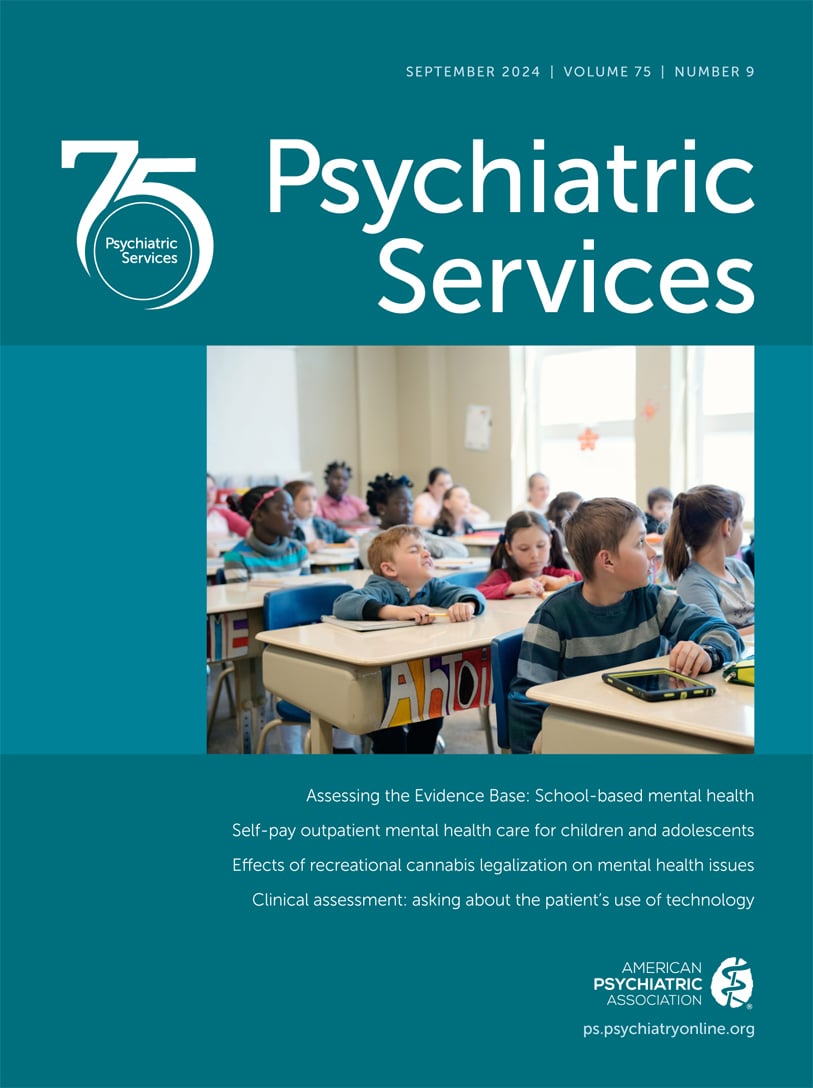Psychiatric Services
- Volume 71
- Number 9
- September 2020
Taking Issue
Articles
Publication date: 04 May 2020
Pages885–892Objective: Patients with severe mental illnesses and related conditions, such as substance misuse and suicide attempts, are among the highest utilizers of acute inpatient medical services. The objective of this study was to assess the impact of a ...
https://doi.org/10.1176/appi.ps.201900385Publication date: 03 June 2020
Pages893–898Objective: This study examined variability among U.S. hospitals in rates of seclusion and physical restraint, including the effects of hospital type and ownership, as reported on Hospital Compare. Broader aims were to highlight the wide variability in use ...
https://doi.org/10.1176/appi.ps.202000011Publication date: 30 June 2020
Pages899–905Objective: The goal of this study was to estimate the incidence of falls (total, injurious, and assisted) in U.S. psychiatric care across 6 years (April 2013–March 2019). Methods: Data on falls among patients of adult and geriatric psychiatric units of ...
https://doi.org/10.1176/appi.ps.202000004Publication date: 12 May 2020
Pages906–912Objective: Individuals with serious mental illnesses are at risk of receiving inadequate outpatient mental health services, increasing the likelihood of medication nonadherence, readmission, and self-harm. The purpose of this study was to identify ...
https://doi.org/10.1176/appi.ps.201900363Publication date: 22 May 2020
Pages913–919Objective: Emergency departments (EDs) offer opportunities to deliver critical frontline suicide prevention services via assessment, safety planning, and linkages with community-based mental health care after discharge. Because mental health crises can ...
https://doi.org/10.1176/appi.ps.201900536Publication date: 22 May 2020
Pages920–927Objective: Adverse selection in medical insurance is well documented; however, little is known about the role of behavioral health. This study’s objective was to examine the probability of being enrolled in the lowest-deductible plan among commercially ...
https://doi.org/10.1176/appi.ps.201900354Reviews & Overviews
Publication date: 28 May 2020
Pages928–940Objective: Since the first recovery college (RC) opened in England in 2009, many more have begun operating around the world. The body of knowledge regarding the effects of RCs is growing, suggesting their benefit to recovery, well-being, goal achievement, ...
https://doi.org/10.1176/appi.ps.201900352Special Article
Publication date: 24 June 2020
Pages941–946In creating medical marijuana laws, state governments signal to the public that marijuana can safely and effectively treat a wide range of diseases. In many cases, these state approvals overestimate the benefits of marijuana and understate the risks. ...
https://doi.org/10.1176/appi.ps.202000140Brief Reports
Publication date: 24 July 2020
Pages947–950Objective: This study aimed to investigate whether state Medicaid programs systematically reimburse psychiatrists less than they reimburse primary care physicians. Methods: This study used outpatient Medicaid claims data from 2014 for 11 U.S. states. Claims ...
https://doi.org/10.1176/appi.ps.202000062Publication date: 15 July 2020
Pages951–954Objective: In recent years, there has been growing awareness of the need for cultural adaptation of evidence-based practices, which is essential for successful implementation in diverse cultural contexts. This study investigated the impact of a culturally ...
https://doi.org/10.1176/appi.ps.201900424Open Forum
Publication date: 15 April 2020
Pages956–958Employment is a well-recognized and important indicator of recovery from mental illness. However, a broad range of personally and socially meaningful activity and participation opportunities, beyond paid employment, can be valuable for those in recovery. ...
https://doi.org/10.1176/appi.ps.201800498Publication date: 12 May 2020
Pages959–961Preventing sexual violence in psychiatric facilities has been a longstanding challenge that has received only limited attention from researchers and regulators. Numerous factors at the patient-, staff-, facility- and health care system–level contribute to ...
https://doi.org/10.1176/appi.ps.202000038Publication date: 08 April 2020
Pages962–963This Open Forum describes the National Institute on Disability, Independent Living, and Rehabilitation Research (NIDILRR), a component of the Administration for Community Living under the U.S. Department of Health and Human Services. NIDILRR funds applied ...
https://doi.org/10.1176/appi.ps.201900605Global Mental Health Reforms
Publication date: 03 January 2020
Pages964–966Community-based psychiatric services are essential to mental health. For decades, researchers, advocates, and policy makers have presumed that expanding the supply of these services hinges on reducing the supply of hospital-based care. Cross-national data ...
https://doi.org/10.1176/appi.ps.201900086Commentary
Datapoints
Integrated Care
Publication date: 15 April 2020
Pages972–974Novel Current Procedural Terminology (CPT) codes specific to the collaborative care model (CoCM) offer advantages over traditional billing options, but their uptake may require considerable billing and clinical workflow adjustments. This column presents a ...
https://doi.org/10.1176/appi.ps.201900581Promoting High-Value Mental Health Care
Publication date: 28 May 2020
Pages975–978Despite the proven effectiveness of early intervention services for first-episode psychosis (FEP), these services are poorly implemented in France. This column describes the establishment in 2018 of a community of practice dedicated to the implementation ...
https://doi.org/10.1176/appi.ps.201900568Personal Accounts
Social Determinants of Mental Health
Publication date: 01 September 2020
Pages981–983Classification as primary, secondary, or tertiary prevention is based on when during the course of disease the intervention is provided. Another approach to classification—as universal, selective, or indicated preventive interventions—relates to who ...
https://doi.org/10.1176/appi.ps.201900374Editor’s Choice
Past Issues
View Issues Archive
Vol. 75 | No. 12

Vol. 75 | No. 11

Vol. 75 | No. 10
